Generosity creates magic
Finding the right collaborator, and growing together, is a creative feat. While songwriting duo Kristen Anderson-Lopez and Robert Lopez were writing the iconic songs to “Frozen,” they discovered the key ingredient to a successful and lasting collaboration: generosity. Kristen and Robert offer insight on how to be a generous collaborator — from not walking out the door when things get tough, to offering space to play together. Being generous with your collaborator creates an alchemy that is truly magical. For Kristen and Robert, that meant writing songs like “Let It Go” for two of the most successful animated films of all time.

Transcript
Table of Contents:
- Chapter 1: It’s like a marriage
- Chapter 2: The meeting with Disney
- Chapter 3: A terrible notes session
- Chapter 4: Resilience
- Chapter 5: A play date gone bad
- Chapter 6: That’s a moment for a song
- Chapter 7: She came into her own power
- Chapter 8: Writing “Let It Go”
- Chapter 9: Finding the David in the block of marble
- Chapter 10: The highs and lows of success
- Chapter 11: Show yourself
- Chapter 12: What Frozen means to us now
Transcript:
Generosity creates magic
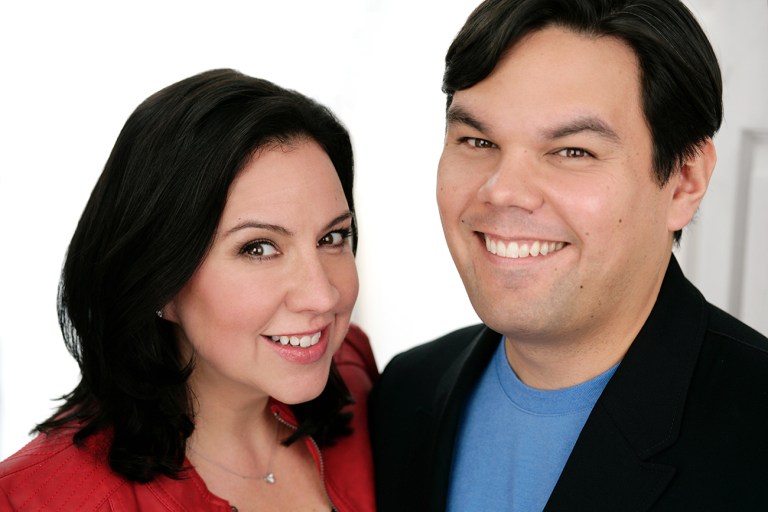
Chapter 1: It’s like a marriage
KRISTEN ANDERSON-LOPEZ: I was single for the first time in six years.
ROBERT LOPEZ: I had been in the class for two years already, so I was sort of an upperclassman.
KRISTEN ANDERSON-LOPEZ: The BMI Lehman Engel Musical Theatre Workshop, it’s a mouthful to say. Most people just call it BMI.
ROBERT LOPEZ: We were doing Avenue Q, our very first performance of Avenue Q in fact.
KRISTEN ANDERSON-LOPEZ: He walked in, and he had this shiny, floppy hair, and I just thought it was the cutest thing, and then he put on a red wig.
ROBERT LOPEZ: We didn’t have puppets yet. I was wearing this red yarn wig. I was Kate Monster. Kristen came up afterwards.
KRISTEN ANDERSON-LOPEZ: And, I was incredibly effusive about his work. It was just the most exciting thing I had seen in a really long time, on the stage, just loving everything that came out of Bobby’s fingers at the piano, but I also thought he was crazy cute.
ROBERT LOPEZ: I gave her my demo tape, which had my number on it. I was like, “My number’s on there.”
KRISTEN ANDERSON-LOPEZ: Finding your collaborator is as hard as finding a husband, I think, or a spouse of any kind. It needs to be someone who inspires you. It needs to be someone who you feel safe with. It needs to be someone who brings out the best in you and nurtures the best in you. It needs to be someone you can laugh with and have hard conversations with. As much as you should be able to create beautiful things together, you also need to be able to communicate when things fall apart. It’s a marriage.
JUNE COHEN: That’s Kristen Anderson-Lopez and Robert Lopez, a musical writing team who also happen to be married. And they’re about to share the story of writing the songs for the Disney movie Frozen.
It’s the specific story about how Kristen and Robert developed the iconic original songs for one of the most successful animated films of all time. But it’s also a universal story about being a generous collaborator. As you navigate the inevitable tensions in the creative process — generosity creates an alchemy that’s truly magical.
As Kristen and Robert take us on the journey of writing Frozen’s unforgettable musical numbers, you’ll learn how to identify the right collaborators to work with – people who have a generous creative spirit, who won’t walk out the door when things get tough. You’ll also hear how to stay humble and embrace your collaborator’s strengths. Working together means playing together. That’s what allows creative work to flow.
And here’s what you need to know about Kristen and Robert. Robert, who goes by Bobby, co-created the smash-hit musicals Avenue Q and The Book of Mormon. He was the youngest composer ever to win Emmy, Grammy, Oscar, and Tony Awards. Kristen was an award-winning songwriter and lyricist in her own right, who co-created the musical In Transit and has won three of those four awards. Together, they’ve become an unstoppable creative force.
As for Frozen, it’s one of the highest-grossing animated films of all time. It earned an Oscar for Best Animated Film, and also for Best Song for the breakout hit, “Let it Go.”
Frozen is based on the fairy tale “The Snow Queen.” It follows a complicated relationship between sisters Elsa and Anna, played by Idina Menzel and Kristen Bell. The original movie was followed by a sequel and a Broadway musical, both composed by Kristen and Bobby.
I’m your host, June Cohen, and on this episode, you’ll hear original music composed for piano and upright bass. For visuals while you’re listening, go to sparkandfire.com.
[THEME MUSIC]
The original trailer from Frozen.
Chapter 2: The meeting with Disney
ROBERT LOPEZ: I was getting really tired of work. The stuff that I had been writing in Avenue Q and Book of Mormon was really in service to comedy. I didn’t really want to do another spoof musical that was trying to top Book of Mormon for laughs. My biggest inspiration was Steven Sondheim. I wanted to write stuff that had range in depth and could really speak on all emotional levels.
KRISTEN ANDERSON-LOPEZ: I had had an off-Broadway show called In Transit, but we were up against each other the same year that Book of Mormon was winning all the awards.
ROBERT LOPEZ: When I was out in LA one day, Disney Animation called. They said, “Would you like to come over to the studio and see this thing we’re working on?
I didn’t have a car, so I just got in this junky cab with no air conditioning, arrived really late because the trip was two hours, and I thought it would be half an hour, so I really blew it. I got to the gate of the animation building, which has the Sorcerer’s Apprentice hat, it’s that building. I was sweating from the lack of air conditioning. The head of music at Disney, he said, “Oh, it’s okay. We just talked to Alan Menken, the composer, we’re fine.”
So, that set the tone. I was apologizing, and I was just mortified. They pitched me the story in a Disney Animation room that had a history to it, one of these hallowed rooms where they made The Little Mermaid and Beauty and the Beast and all of these amazing Disney classics. They pitched me this story for Frozen. Anna and Elsa were sisters.
Kristen has sisters who are twins. They’re much younger than her, so she sort of had a hand in raising them. Plus, we had these daughters of our own, and they were the heart of our life. I began to feel like there would be a personal connection. There was something in there for me to learn and something in there for Kristen to say. My pulse just got faster and faster. I began to realize this could be really exciting, and I’d get to be the one to tell Kristen about it. I basically said yes in the room, and I called Kristen right away.
KRISTEN ANDERSON-LOPEZ: It was one of those rare sunny days. I’m driving our minivan down the West Side Highway, probably from the ear, nose, and throat doctor, with a toddler strapped in a car seat behind me and a four-year-old in her little booster seat, and Bobby says, “I think I found our next project. It’s all about sisters, and it’s everything that you care about.”
ROBERT LOPEZ: And I said, “You will say yes to this idea. This is the thing you were meant to do, so I’m going to do it with you.”
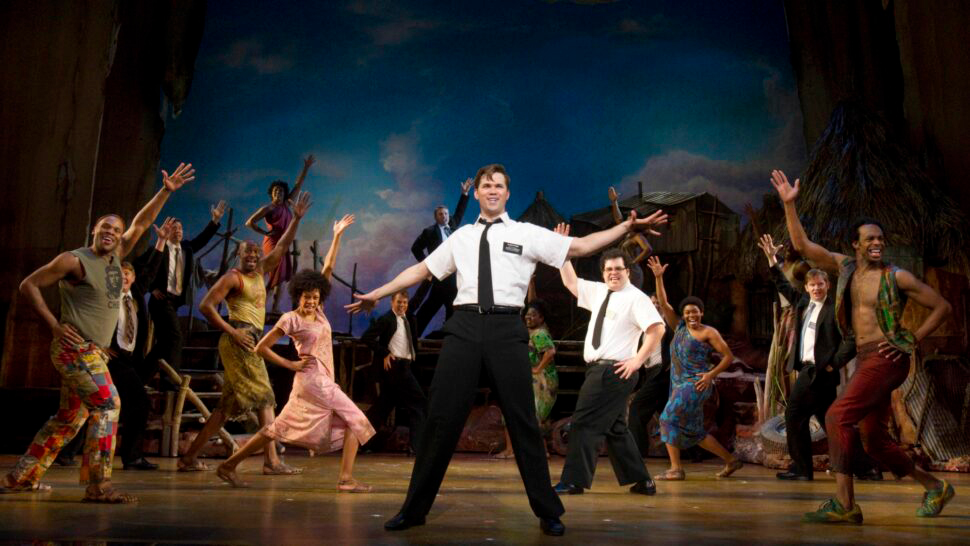
The musical “Book of Mormon” was a huge success for Bobby Lopez. But he realized he wanted to write something that spoke to more emotional levels, beyond comedy and spoofs. Photo of Andrew Rannells and the original cast of “Book of Mormon,” by Joan Marcus
Chapter 3: A terrible notes session
How do you bounce back from criticism? Know when to lead — and who to follow.
KRISTEN ANDERSON-LOPEZ: Disney himself had tried to do a version of “The Snow Queen” way back in the ’50s, but “The Snow Queen” was just too abstract, and now this amazing director, Chris Buck, who had done Tarzan, had worked with another writer, and they had found their way to a sister story. “The Snow Queen,” like Elsa’s character, was this evil, villainous woman with spiky blue hair, and Anna was this perfect princess in a really annoying way. We actually sat in a room where Idina and Kristen were brought in to read this version of it right at the very beginning of our process.
And they also rolled in a Yamaha keyboard, and somebody started to play “You Are the Wind Beneath My Wings” right at the very end, which Idina and Kristen sang in harmony across John Lasseter. Bobby and I both didn’t know that that was going to happen, and we were a little bit like, “Oh Jesus, are we going to have to write ‘You Are the Wind Beneath My Wings’?”
We wrote a couple songs for that version. We wrote a song called [singing] “I Want You to Be Cool With Me” for evil Elsa. We had written a huge opening number watching the two sisters grow up that was an epicly long seven-minute opening number, for the first screening.
ROBERT LOPEZ: We wanted people to cry at that opening, because we felt like we had written something very emotional, but everyone’s eyes glazed over. It was just a dead, limp audience for that first song, and I kind of felt like, well, this whole experiment and being emotional in my music is going terribly. I should be doing comedy. Let’s get out of this project.
KRISTEN ANDERSON-LOPEZ: That screening was on my 40th birthday.
ROBERT LOPEZ: For some reason, they had this puppet of Olaf, and one of the animators thought he could do puppetry, and the lip sync was all off the way he did it, and I was always like, “Oh God.” And they had him come in with a big cake and Olaf the puppet to sing Happy 40th Birthday to Kristen in the middle of this terrible note session.
KRISTEN ANDERSON-LOPEZ: It couldn’t have been more awkward. We were told: “No matter how well it goes, we’ll at least go to Dairy Queen, because that’s what we always do. We always go to Dairy Queen after a big milestone.” And it went so horribly that the director, Chris Buck, was like, “We’re not going to Dairy Queen.”
The writer at the time was like, “I don’t think this is a musical. I think…” He had written a really cool live-action script. He had written a good story with good characters and good dialogue, but nothing about it sang. It was all about two unlikable people doing very nuanced things, and nothing about their hearts or their emotions felt big.
ROBERT LOPEZ: The director Chris Buck said, “Would Fraulein Maria sing ‘The Sound of Music’ after she had just sort of stabbed her sister in the back?” I’m not sure. I said, “We could easily make this not a musical, and we could just shake hands and step away, because I’m not sure that we have the ingredients for a musical here with the characters the way they are.” And Lasseter said, “Oh no, this is going to be a musical, and you’re staying right where you are. We’re going to make it one, and it’s going to be a good one.”
KRISTEN ANDERSON-LOPEZ: In a different circumstance, that could have been a very depressing day, but for me it was the beginning of something so exciting. I was so energized by: I know what this can be. I know we can make this incredibly great, if I can just find the right way to be heard about the different changes we could do to really make it a musical and an important musical for sisters.
There was this amazing voice behind us in the chairs, bringing out these really good notes, who happened to be Jennifer Lee. She was there working on Wreck-It Ralph. What she was saying was so good, every time she spoke, I would sort of turn and go, “Yes, yes.” And within a month she was the writer. And that was the best, best turn of luck.
JUNE COHEN: Did you feel a knot in your own stomach when Bobby described the eyes of the audience glazing over? We’ve all lived some version of that story. But then, something magical happens. Jennifer Lee starts talking, and her collaborative notes transform the mood. With her generosity, everything becomes possible again.
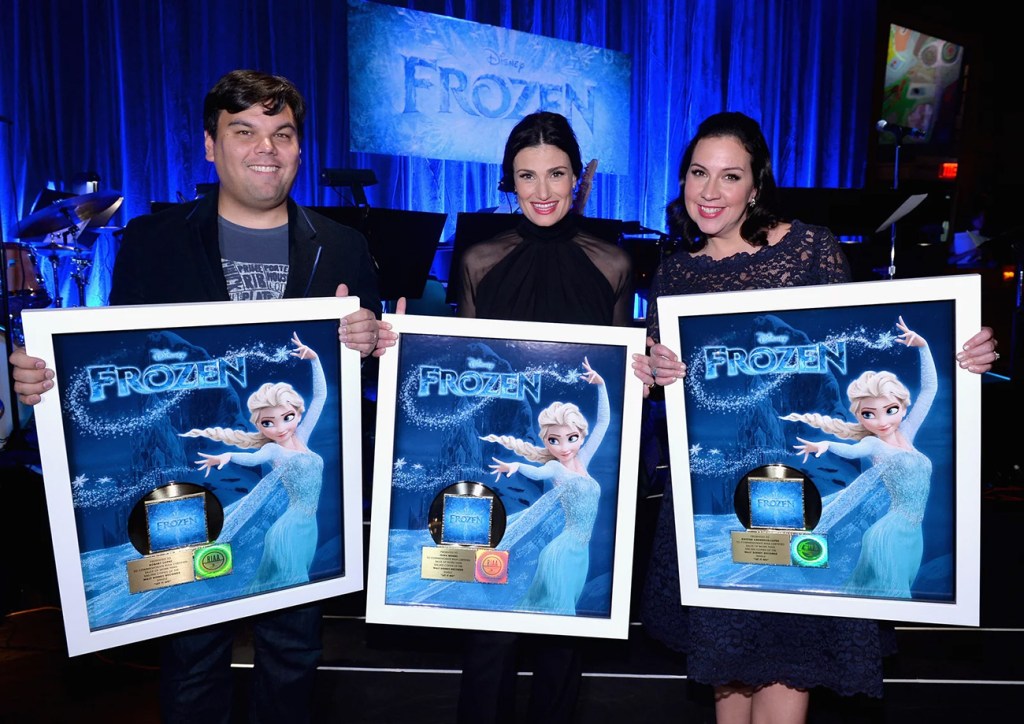
Spoiler: “Frozen” goes on to become a huge hit, and the cast album tops the Billboard 200 chart some 13 times, breaking the record for an animated film soundtrack. But what seems inevitable in hindsight was anything but in the moment. Singer Idina Menzel (center) and Frozen songwriters Bobby Lopez (left) and Kristen Anderson-Lopez pose with gold records. Photo: Alberto E. Rodriguez/Getty Images for Disney
Chapter 4: Resilience
How do you stay motivated when all your work is thrown out? Feel your feelings — then take your eye off the rearview mirror.
KRISTEN ANDERSON-LOPEZ: Everyone keeps asking us, “You get a script, and you just do the songs, right?” And that’s not how it works at all. Everything is iterative. The story is evolving as you’re doing the songs, so you write like six movies. And I knew we were going to have to do this at least five more times, and the songs will fall away or shape where you’re going, depending on what’s working in the screenings.
ROBERT LOPEZ: I was still hurt that the songs had been cut. And I was feeling that sense of waste. Like you’d been through a whole creative process, and you want to keep what’s good about it, what you loved about it. I always had one eye in the rearview mirror looking for what we could salvage. But of course the answer really lay in going ahead and writing something else.
KRISTEN ANDERSON-LOPEZ: We were expected to write a lot of songs, and the story was still really wonky and often super shaky. We’d write some songs that I even knew, ”This story point is never going to work.“ And I would know that they were going to fall on the floor. When you are doing six iterations of things, it’s so hard, it’s so tricky to get these things right. They’re so hard to do. I realized that resilience was going to be the name of the game here. So I started researching. You got to feel your feelings about it. You got to do your grief, get yourself up off the floor, and find something you’re excited about doing the next time around. For Frozen, we wrote 27 songs, not all the way through. There’s seven and a half in the movie. So we had to practice resilience 20 other times.
Now we’ve found this wonderful thing that we hold onto, which is, we write songs for fun. Even when we’re on vacation, we write songs. That’s our favorite thing to do in the whole wide world. So it makes us feel better when something gets cut. We realize a song that falls on the floor is just another chance to get in the room together and write another song.
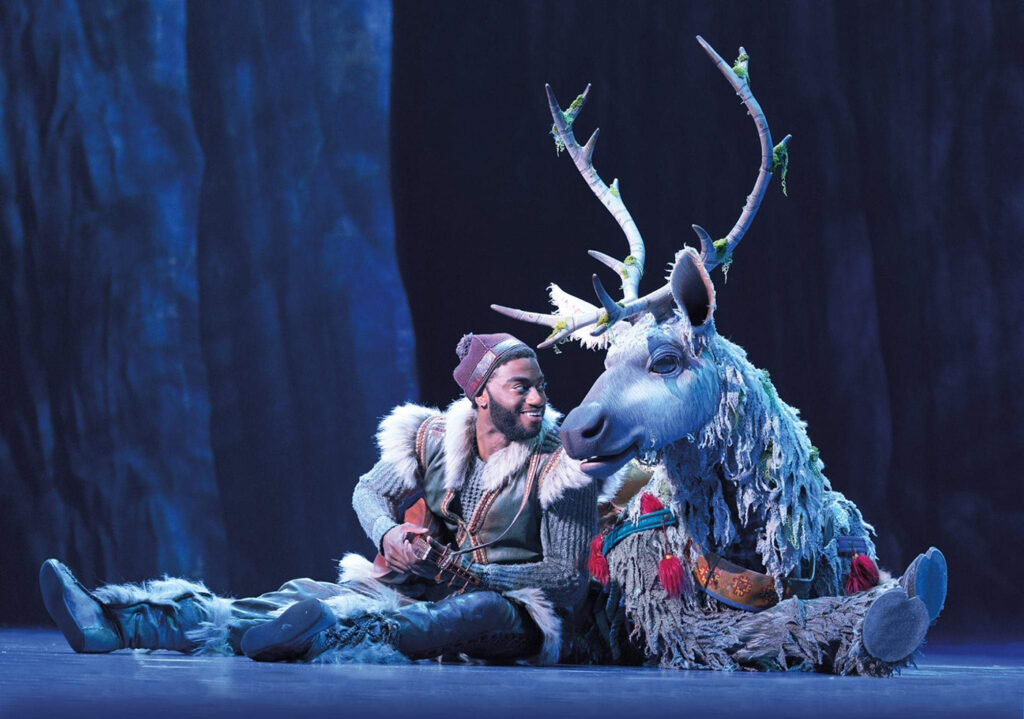
What’s the “and a half” song? “Reindeers Are Better Than People.” Jelani Alladin as Kristoff with Andrew Pirozzi as Sven in the Broadway musical version of Frozen. Photograph: Deen van Meer
Chapter 5: A play date gone bad
KRISTEN ANDERSON-LOPEZ: Early on in our collaboration, every time we had to write a big song, we could sometimes get really competitive over credit and also control. It felt like a race for who’s going to come up with the best idea, because whoever comes up with the best idea gets to control the song. And that wasn’t serving us really well. What happened is we always got in a fight.
ROBERT LOPEZ: She would start writing before I was really ready. She would come to me with some stuff written down, and it would upset me.
KRISTEN ANDERSON-LOPEZ: I generate ideas from scribbling. I have to start the actual physical act of writing something to prime the pump and just get a bunch of stuff out there. And I think Bobby used to be really threatened by that.
ROBERT LOPEZ: I would be like, “Hey, I’m part of this too.” And then I would try to control the flow of creativity and try to put her down a little bit, which was … That’s not the way to do it.
KRISTEN ANDERSON-LOPEZ: So we would get in fights.
ROBERT LOPEZ: We’d get in lots of fights.
KRISTEN ANDERSON-LOPEZ: He was like, “We do everything in the room together.” And I was like, “I can’t do it together in the room with you. Because you’re mean when you write.”
ROBERT LOPEZ: And I would be like, “I’m mean because that’s what makes us good.”
KRISTEN ANDERSON-LOPEZ: And then I would be like, “I don’t know if I should be married to you. Maybe we should just have sandwiches.”
We’ve learned over the years that we do have these very different strengths. We really compliment each other in so many ways. Like we’ll talk, and we’ll talk, and we’ll talk, and we’ll talk, and then I’ll be like, “I need to go brain drain now.” Sometimes we both brain drain. Sometimes he just goes to the piano while I’m brain draining. Then we have a lot more of a grab bag of things to really find: What’s this going to be?, to congeal some form.
You really have to be able to play and feel safe playing. I know we just acted out the worst version of that. That’s a play date gone bad. But in general, why I love what I do every day is that we get to take these stories and these characters and then just play in a room. Literally sometimes acting them out. Bobby channeling the essence into some music. And we’re just improv-ing together, and that’s play, and that’s really fun. And you’re not worried about time. You’re not worried about who’s doing what; you’re losing yourself in the flow of fun.
JUNE COHEN: Did you find yourself laughing in recognition as Kristen and Bobby recount their play date gone bad? At their worst, they get competitive over credit and control. At their best, they’re generous and playful collaborators — and that creates the magic.
Chapter 6: That’s a moment for a song
KRISTEN ANDERSON-LOPEZ: There was this story summit in the coolest hotel in LA, the Sunset Marquis. It’s like the rock-and-roll hotel. We just camped out all day long for two days inside this lounge area and reinvented the sisters. Made Anna the screw-up, a wild child but also a bit of a, “oops sorry.” What is that character who’s always trying and has a giant heart, but maybe not a lot of nuance? And we got Anna there.
And then we discovered Elsa. Okay, Elsa’s going to be the perfect one. We talked a lot about siblings and the pressure that first children have to live up to their parents’ expectations. We’ve talked about the royal family, what it would feel like to be the heir apparent and have all of that on your shoulders — and then have some shameful secret.
ROBERT LOPEZ: We had these two designs. We had Elsa as the buttoned-up princess with a secret. And then we had Elsa as the snow queen. And we knew that there would have to be this moment after her secret was exposed, that she would have to somehow transform from the first design to the second design. Transforming not only the way she looks, but the way she is going to act from now on in the story. She’s going to stop holding everything in, and she’s going to let it out. What Kristen and I immediately zoned in on was: That’s material for a song.
KRISTEN ANDERSON-LOPEZ: “Elsa’s badass song” was up on that whiteboard. There’s an old cliché that you sing when your emotions are so big you can’t talk anymore.
ROBERT LOPEZ: You’re definitely looking for moments where there’s a lot of emotion, where there’s a big decision that gets made, when there’s a transformation. Moments where a character really wants something. It’s also something personal to you as an artist; you need to identify with it in some way. A palpable appetite to write it. You have to really want to. If you don’t want to, you won’t like it, it’ll be boring, it’ll be garbage.
KRISTEN ANDERSON-LOPEZ: I just call it heat. And it’s a gut thing. You could just feel it in your gut that you’re like, “I just, I want to write this song. I know what it can be.” Because I felt that emotion too, in such a big way that I needed to sing.
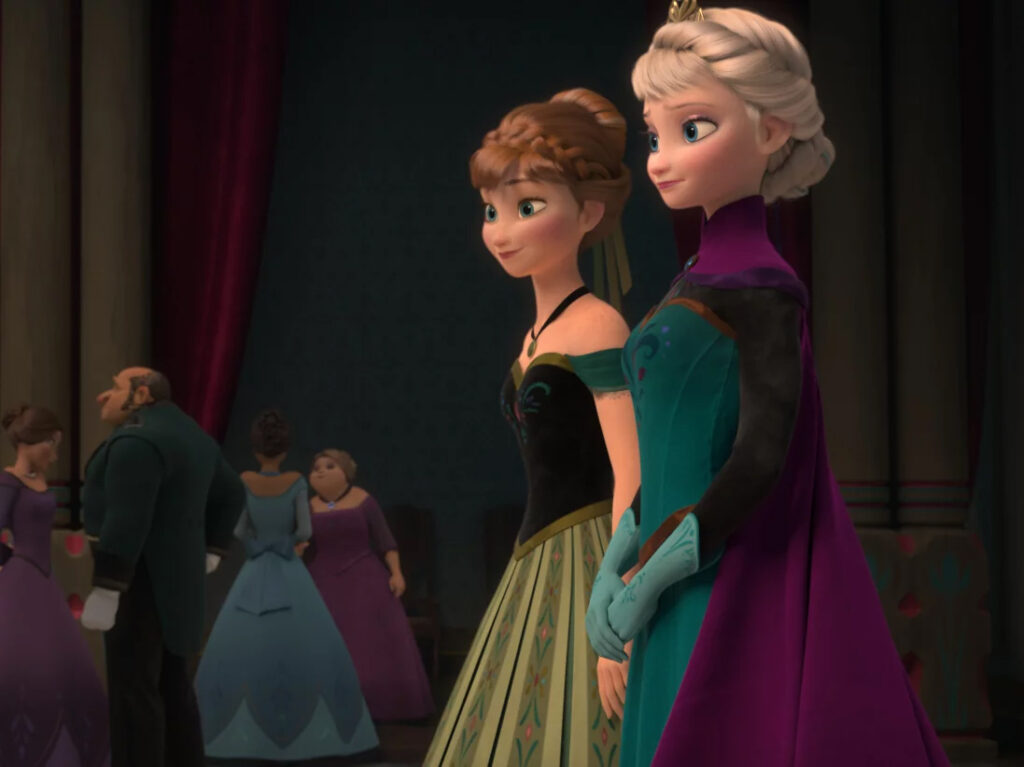
Kristen describes how the sisters’ characters developed at a story workshop: “Anna’s the screw-up, a wild child but also a character who’s always trying and has a giant heart. And then we discovered Elsa. Okay, Elsa’s going to be the perfect one.” Image courtesy of Walt Disney Pictures
Chapter 7: She came into her own power
What do you do with your envy — when a collaborator shines more brightly? Let it go. And let them take the lead.
ROBERT LOPEZ: We used to work in this office that we had that was above a Greek restaurant on Sixth Avenue in Brooklyn. It was kind of a crummy little place, but we would just hunker down there and eat bagel sandwiches because we lived near the best bagel place in Brooklyn. And we were eating lunch, and Kristen said, “I think that the song should be called ‘Let It Go.’”
KRISTEN ANDERSON-LOPEZ: We knew that we needed to tell the story of someone who was grieving what had happened, letting go of everything that she’d left behind. And then going through the logic of: Oh, but look what’s ahead of me.
ROBERT LOPEZ: I just remember thinking, yeah, that’s an obvious title. I think I kind of said, “Yeah, that’s cool, but let’s keep talking about it. I don’t know what it should be.” And then we had the meeting with Disney.
KRISTEN ANDERSON-LOPEZ: There are just a few times that I will just do a hail Mary when Bobby’s like, “We’re not ready. We’re not ready to share. We’re not ready to share.” And there are a couple times that I just have to be like, “I think we’re ready to share.”
ROBERT LOPEZ: Kristen said, “I think the song should be called ‘Let It Go.’” And they were all like, “Yeah, definitely. That should be the title.” And Kristen was definitely looking at me like, “I know I’m not supposed to pitch a title idea that you didn’t sign off on, but I think I was right to do it.” And I was like, “Yeah, I guess so. I guess so, all right. Let’s move on. It’s ‘Let It Go.’ Here we go.”
It was the time of Adele and Katie Perry.
KRISTEN ANDERSON-LOPEZ: I took my daughter ice-skating, and I heard this song that was very piano-driven. And I was feeling like I was flying, and I loved it. It was the first time I ever heard “Someone Like You,” or — that one, right?
ROBERT LOPEZ: Yeah, that one, yeah. And Kristen said, “Here’s what I’m thinking that this song is.” And there were other songs like that on the radio at the time.
KRISTEN ANDERSON-LOPEZ: Yeah, like the “Baby You’re a Firework,” from the … “did you ever hear” … these huge, huge ranges. I said, “I want this to be unlike any other Disney princess. This isn’t like a ‘sitting on the log yearning for the prince to come’ song. I want to do a big pop diva number here and redefine the badassery of Disney princesses.”
ROBERT LOPEZ: I thought it was brilliant, and I thought it made a lot of sense for Elsa to be a pop diva.
KRISTEN ANDERSON-LOPEZ: This is a moment to use the four-chords of awesome.
ROBERT LOPEZ: Those chords, those are the pop hit chords, the chords of awesome. It’s one, five, minor six, four. And lots of songs have these chords. From Journey, “Don’t Stop Believin,’’ to “Can You Feel the Love Tonight?” But I had always said, it feels a little like cheating to use those chords. Let’s not do anything obvious. But when Kristen pitched it, I thought, “This is a moment of a woman claiming her power. And these chords are right to use. Let’s do it. Let’s let this be the one exception when we do it.”
I thought, I’m going to let Kristen take the lead. I’m watching Kristen come into her power at the same time as we’re writing this show. I’m watching her gain confidence in a way that she didn’t have before.
Chapter 8: Writing “Let It Go”
KRISTEN ANDERSON-LOPEZ: Then we went for a walk.
ROBERT LOPEZ: We had enough of our cramped quarters and eating bagel sandwiches together and just sitting in the same small room. So we were like, “Let’s walk in Prospect Park.”
KRISTEN ANDERSON-LOPEZ: Part of the fun of what we do is that it also forces us into each other’s psychology. So I love to ask questions like, “What was a moment where you ever felt you had to just leave everything in the past?” And he told me this story. Bobby was under huge amounts of pressure as a high school student. He went to Hunter, which you have to be in the top 1% of New York kids to go there. And then he was at the top of his class there. He imagined if he really just bombed the SATs, wouldn’t it be so great to not have to worry about living up to his potential all the time?
I was like: “That, that is what Elsa is feeling right now. She’s so upset that she messed up everything that she’s tried for her whole life, and yet, how awesome that she doesn’t have to do it anymore.” And then I started thinking about it from a mother’s perspective. At the time I was feeling — talk about pressure! You’re worried about what you look like, be a perfect mom, and make the quinoa, and have them dressed nicely, and look like you’re involved enough, but you’re also having to do your job. I jumped up on a picnic table and just imagined: What if I just stopped worrying about everything? What if I just let it all go? That’s when I improv-ed throwing snow and going, “Let it go, let It go.”
ROBERT LOPEZ: I just remember feeling totally embarrassed and looking around to see who could see us. I was like, “Oh my God,” just absolute embarrassment.
So then we went back to the office, energized with that walk. I was saying, “I want to write a song that has some images in it, because we never write songs with poetic imagery.” She was like, “What do you mean? Pitch me something.” And I said, “Snow glows white on the mountain tonight.” And I did those first few lines, and Kristen was like, “whoa.”
KRISTEN ANDERSON-LOPEZ: He just spontaneously wrote, “The snow glows white on the mountain tonight, not a footprint to be seen. A kingdom of isolation, and it looks like I’m the queen.” Bobby wrote those four lines. The most purple emo lyric.
ROBERT LOPEZ: I was getting in touch with my feminine side.
KRISTEN ANDERSON-LOPEZ: I know it was good.
ROBERT LOPEZ: It felt like things were clicking.
KRISTEN ANDERSON-LOPEZ: Bobby is the one who said “Cold never bothered me.” He’s like, I want something like petulant. I want something bratty.
We played it for our girls, and our girls at this point are seven and two. And they are our toughest audience. Sometimes we’ll play something, and they’ll wander off during it, and then we know that’s not good. But with this song, they kept wanting us to play it again and again and again. And I thought: There’s something there. I’m excited because our girls are so excited about it.
(Transcript-reading friends, let’s have a quick sing-along before moving to the next chapter. Idina Menzel singing “Let It Go.”)
Chapter 9: Finding the David in the block of marble
How do you keep faith when everyone says “It sucks”? Trust the amazing alchemy of generous collaborators.
ROBERT LOPEZ: Once we put the song into the movie, it didn’t immediately work. Jen Lee said, “I’m going to have to rewrite this whole thing” — to earn the emotional resonance of the song and everything that it could do. Everything about the process of writing, it was really about earning “Let It Go.” That was really the hard work.
KRISTEN ANDERSON-LOPEZ: And that’s not our superpower. There was no prescriptive now we know what to do. The superpower of this song works. And now I have to figure out how to make the movie work around it. That’s really where Jennifer Lee’s superpower comes in.
Jennifer Lee is the one who was okay with the mess. As long as she can see the David inside the marble, she can sit through the days and days of everyone saying, “It sucks. It sucks. It’s so terrible.” And she can be, “Just wait, just wait. I know where it’s going. I know we’ll find it.”
ROBERT LOPEZ: It took a long time to get the right beginning, to get the right middle and get the right ending. Kristen plus Jennifer Lee in this creative room really skewed the point of view to where it should be, which is female writers writing about female issues. And sister love in a way that the men in the room couldn’t bat down or dismiss. When Kristen would express an idea and Jen would back it up, or when Jen would express an idea and Kristen would back it up, those ideas got on the roster, and they formed the basis of the story.
KRISTEN ANDERSON-LOPEZ: The amazing alchemy that happens with the right collaborators. Jennifer Lee, she’s just very generous. If you do something that pleases her or touches her, she lets you know, and it doesn’t feel false at all. Like, she’ll cry, and she’ll emote, and you will feel supported in a really authentic way, but she will also fight like a dog with a bone to make sure the story is working.
It’s like making Ikea furniture. Sometimes that shelf does not look like a shelf until you turn that last screw. We only got there, like, at the very last minute for the first public preview in Phoenix.
This is a screening where things aren’t animated. Sometimes you have the figures without their clothes on, walking around. They do all this metric stuff. The numbers came back, and we thought it was wrong. And then they did another screening, and the audience metrics came back the same way. The powers that be were like, “This is really good. You’re going to get the private plane that takes John Lasseter back to LA together, because you guys have just done it.”
That was the first time that I ever went, like, This might actually work. Bobby and Jennifer Lee and I just collapsed in a big crying hug, and then drank chardonnay on the plane.
Chapter 10: The highs and lows of success
ROBERT LOPEZ: I had always loved Star Wars. The phenomenon of that was my kind of universe growing up. And I feel like Frozen has become a little like that for the two of us. Because it became this phenomenon, I felt a little trapped by it.
KRISTEN ANDERSON-LOPEZ: Weird little nuances in my own daily life changed. Your peers are wondering, how did she get there and I didn’t? The relationship between just normal moms can change. For a few years, there was a weird moment of, when I met a new kid and a new mom with my girls, needing to figure out, like, when do I tell them? If I wait on it too long, then they’ll be like, “Wait, what?” And their faces will go red, and I’ll feel almost like I’ve betrayed them. If I do it too early, then that’s alienating.
There’s one thing to be in the struggle and to be the underdog, and there’s another thing to feel like you have to live up to something that penetrates the culture the way that Frozen penetrated the culture. Feeling like, oh, do they always need me to be the Frozen lady? How can I keep doing new things and taking risks and not end up a one-hit wonder with “Let It Go,” and like, “Oh, you’re the lady that wrote ‘Let It Go.’” I had to get those stories out of my head.
Chapter 11: Show yourself
How do you keep from replicating your own work? Give space for yourself to change.
ROBERT LOPEZ: I didn’t really know of too many musical sequels that anyone liked. You can count them on one hand, really the great ones. And some of them are like the Ring cycle and The Muppets Take Manhattan and things like that.
KRISTEN ANDERSON-LOPEZ: We all said we’re not going to write “Let It Go” again.
ROBERT LOPEZ: These characters have already run their arcs, and you already know the songs of that arc, and you can’t write them again. How can we write something else, a song that isn’t “Let It Go” but that you would want to hear, some song you would want to hear.
So I was really terrified by this whole prospect, the entire time we were writing Frozen 2. And I think I was sort of the pill in our collaboration. I kept crying and screaming about that.
KRISTEN ANDERSON-LOPEZ: It’s important to have a pill. It is sometimes. I mean, Bobby sometimes was the voice of an extremely dark reality of like, “Oh, we could end up trying to write ‘Let It Go’ again without meaning to,” because it very easily just comes out in the ether. We knew if Elsa was going to have a big song, it wasn’t going to be Elsa feeling her feelings alone, because we’ve seen that. She needed to be in dialogue, and she actually needed to want something. So we found this voice, we found this, like, [singing] we didn’t know what it was exactly. But that voice could represent that feeling of: I know I’m supposed to be somewhere, but I don’t know where.
(If you are feeling it, sing along with this clip of “Show Yourself.” Idina Menzel and Evan Rachel Wood in Frozen 2.)
We, as artists, were still growing and changing. When we were writing Frozen 1, we had two little girls. Where we were in our lives now, we were dealing with the girls who were in middle school, kids who needed to figure out who they are going to be in the world.
When we went and we saw it for the first time, my oldest daughter, she was so beautiful, she was crying in the car home. And she was like, “You wrote ‘Show Yourself’ for me. That’s for me, right?” And that makes me tear up when I talk about it because we are at the point where it is: Show yourself, how can we support you? But you’ve got to go show yourself that you can stay in the advanced math class, show yourself that you can be a counselor at a camp.
ROBERT LOPEZ: Show yourself that you can drive this car without killing both of us.
Watch Robert Lopez and Kristen Anderson-Lopez give performance advice to the cast of Frozen 2 in this very cute clip of the song “Some Things Never Change.”
Chapter 12: What Frozen means to us now
ROBERT LOPEZ: It was the consummation of my career with Kristen, like the beginning of our being exclusive collaborators with one another and having a voice together as a couple.
KRISTEN ANDERSON-LOPEZ: So much of our life has been about learning how to collaborate, first as married people, as parents, and as writing partners. If you want to have a lasting collaboration, you really need to find someone who can have the hard talks and not walk out of the room, people that’ll stay in the boat with you, because it’s going to get tough, and it’s going to get bumpy. And when things get bad, you have to be able to share your vulnerability with each other and not just walk out, because then everything you’ve created falls to the floor. It’s a long journey. You can’t leave halfway.
JUNE COHEN: I want to thank Kristen and Robert for sharing the story of their creative journey. And I want to thank you for listening. I hope you found things in their story that you can bring into your own work.
Maybe it was Bobby saying that creative collaboration is like a marriage: communication and generosity are key.
Or maybe it was the energy between Kristen and Bobby – their laughter, their self-awareness, and their play dates gone wrong.
Or it might be how they keep moving after Frozen — staying generous with each other as they grow and change together as artists.


